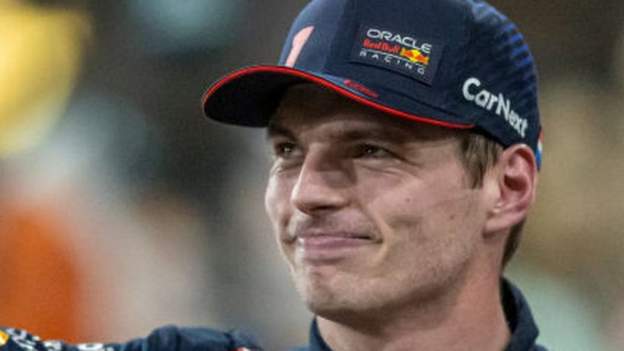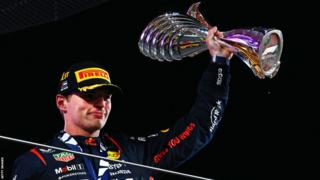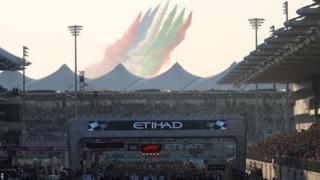The 2023 Formula 1 season drew to a close in Abu Dhabi on Sunday with another crushing Max Verstappen victory, and afterwards Mercedes team principal Toto Wolff likened the task of trying to beat him next season to conquering the highest mountain in the world.
“There is a Mount Everest to climb in order to catch up with Red Bull,” Wolff said.
If you know your mountaineering, even that analogy might not provide a sufficiently accurate metaphor for the challenge ahead of Red Bull’s rivals.
Verstappen and Red Bull have completed the most dominant season in F1 history on every metric. Given the scale of their advantage this year, perhaps K2 – not quite as high as Everest but notorious for being a significantly tougher test – would have been a more appropriate choice.
It certainly sounded that way from Lewis Hamilton’s tone at the end of a race in which he finished ninth, having not been close to competitive all weekend.
The seven-time champion has a tendency towards being monosyllabic when things have not gone well in a race, and this time was no exception. At the end of a series of curt answers, he was asked if he could describe his mood at the end of the final race of the season.
“Not great,” he said. “I just finished ninth. Two really bad races. Red Bull won by 17 seconds and they have not touched the car since August or July, so you can pretty much guess where they are going to be next year.”
What Hamilton is referring to is a fear that, with a car and driver in such dominant form, Red Bull have been able to turn development on to next year’s car much earlier than their rivals, and therefore will be at least as far ahead next year as this.
It is not only Mercedes carrying this concern. McLaren are the most improved team this season, and Lando Norris pointed out that, had the championship started when they introduced the big upgrade in Austria in July that moved their car forward by a second a lap, he and the team would be second in the championship.
But Norris added: “For anyone to catch them is going to be a massive step. They are not just quicker in pace, they are a lot better on (tyre) degradation, like they showed today, and Max is one of the best drivers. It’s a tough combination to beat but I feel like we are getting what we need to challenge.”
And Charles Leclerc, whose second place in Abu Dhabi completed a string of excellent races since an upgrade in Japan in late September brought the Ferrari back towards his driving style, said: “There’s still a long way to go before getting to the Red Bull pace, especially in terms of race pace. We are all aware in the team that there’s still a lot of work to do.”
Yet another landmark achievement
Verstappen’s 19th victory in 23 races secured yet another landmark statistic in a season he has flooded with them.
His winning lap was his 1,003rd in the lead this season, making him the first driver to lead 1,000 laps in a year – 75.7% of all the racing laps in 2023.
The next closest is another Red Bull driver, Sebastian Vettel, who led 739 laps throughout 2011, at 65.23%.
To underline his superiority over the field, Verstappen revealed that not only was he aware of this possibility before the race, but he and his race engineer Giampiero Lambiase had planned their strategy around it. They deliberately delayed both his pit stops to give him more laps in the lead.
“I knew it was on the cards, of course, going into the race,” Verstappen said. “From the engineering side with the strategy, we wanted to try and plan it in a way that I wouldn’t pit too early. So, just wait for others to pit.
“To try and achieve that it was maybe not always the, let’s say, the fastest strategy. But I wanted to stay in the lead, to get the laps in.”
It was just the latest way he and Red Bull had chosen to rub the noses of their rivals in their helplessness.
Afterwards their team principal, Christian Horner, pointed out nothing could be taken for granted in terms of their success, and that they brought to an end Mercedes’ run of seven drivers’ titles in 2021 the year after the Silver Arrows’ most successful season.
“If you remember, that was their most dominant year ever and yet we were able to beat them in 2021,” he said.
It was pointed out to him that there was an aerodynamic rule change between those two seasons that made a key difference to the relative performance of the two cars, which was not the case now.
“There was a subtle rule change,” Horner accepted, “but nothing stands still and we’ve seen competitors coming closer at different venues.
“I’m sure (car) concepts will converge. Stable regulations always concertina (the field), so I don’t think we’ll ever be able to repeat the season we’ve had.
“But hopefully we can take the lessons from RB19 and put them into RB20 and come up with a car we can defend these titles with.”
A bittersweet success
Mercedes did have something to celebrate in Abu Dhabi. Despite an onslaught from Ferrari in the last third of the season, they managed to hang on to second place in the constructors’ championship – by a scant three points.
But even that involved some luck. Had Verstappen’s team-mate Sergio Perez, who finished second on the road, not been penalised by five seconds, Ferrari would have taken it.
In the final stint, Perez was always going to pass the Mercedes of George Russell, but Leclerc was too far ahead for him to catch without help, so the Red Bull would have finished third between them.
But knowing about Perez’s penalty, Leclerc slowed down so Perez could catch and pass him after the Red Bull had passed the Mercedes, in the hope the Mexican could pull out enough of a lead to negate his penalty. The plan failed, by just over a second.
Leclerc and Ferrari resisted the temptation to block Russell on the final lap on the grounds of practicality and sportsmanship.
The result earns Mercedes an extra $10m more in prize money than Ferrari, but it is to some degree a double-edged sword, because of F1’s rules aimed at closing up the field over a period of several years.
The constructors’ championship finishing positions are linked to a sliding scale of permitted aerodynamic research – with the champions permitted the least, and the team finishing last the most.
Wolff said: “P2 is better for the money and the (staff) bonuses; P3 is better for the wind tunnel (allowance). They (Ferrari) have 7% more than us and we would have had 14% more than Red Bull (had we been third).”
‘Next year is a clean slate’
Mercedes decided as long ago as the first race of the season that they would have to abandon their current car-design concept and switch to a new one. So it could be argued they have focused on their 2024 car even earlier than Red Bull.
But the big difference is Red Bull clearly understand how to get the best out of the technical rules that were introduced in 2022. And no one yet knows whether Mercedes do – not even themselves.
“Red Bull started with these regulations in 2022 with a massive advantage and were able to maintain it,” Wolff said.
“You have to have a lot of respect for their achievements on the engineering side, and the driver. And beating them under the current regulations is against the odds, that’s clear.
“But at the same time we have seen with McLaren, where an update unlocked a second’s lap time, Alpha Tauri coming strong at the end (of the season), and Aston Martin over the winter, that there is a key to unlock dramatically more performance.
“And I think us assessing it in an honest way that this car was never going to be good enough to fight for a championship, we took a decision in the spring that we were going to go back to the drawing boarding and come up with something new next year.”
Russell said: “We’re taking a clean slate into next year’s car. The positive is we’re not scratching our heads why we’re so far behind Red Bull.
“We see so many flaws with this car, which gives every single person back at the factory so much motivation and fire to chase after those problems and find those solutions, which we think will make a good step into next year.
“Of course, I expect Red Bull to make a step again. But I’ve got no doubt, come (the first race of 2024 in) Bahrain, we’ll be in a stronger position than we were in Bahrain this year.”
Wolff concluded: “We are changing the concept. We are completely moving away from how we laid out the chassis, the weight distribution, the airflow. Literally almost every component is being changed. Only by doing that do I think we have a chance.
“We could get it wrong also.
“So between not gaining what we expect, and catching up, and making a big step and competing at the front, everything is possible.
“There is always scepticism, but that’s the mentality in the team and that pushes us forward to never give up.”

Olivia Martin is a dedicated sports journalist based in the UK. With a passion for various athletic disciplines, she covers everything from major league championships to local sports events, delivering up-to-the-minute updates and in-depth analysis.









